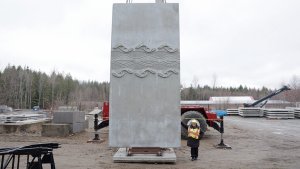After months of sparring in the press, some of B.C.’s largest construction organizations, unions and government officials gathered in person to discuss the province’s controversial Community Benefits Agreement (CBA).
While the panellists staked out firm positions on CBAs and at times passionately disagreed over who does a better job of supplying labour, they agreed increasing the participation of underrepresented groups in the industry is a crucial goal.
The panel at Buildex Vancouver was sponsored and organized by the British Columbia Construction Association and moderated by association president Chris Atchison. It included B.C. Infrastructure Benefits Board (BCIB) chairman Allan Bruce, Progressive Contractors Association of Canada president Paul de Jong, BC Building Trades executive director Tom Sigurdson, Independent Contractors and Businesses Association (ICBA) president Chris Gardner and Construction Labour Relations Association of B.C. president Clyde Scollan.
Bruce kicked off the panel by expressing his support for the model.
“I really believe in the opportunities provided under the CBA,” said Bruce. “I believe in the way those benefits will positively impact the individuals, their families and the communities they live in. I am pleased at how those benefits will extend to the Indigenous peoples of B.C. and their communities.”
He said the idea that any qualified workers or contractors in B.C. won’t be allowed to try and work on government projects are myths. Bruce argued the CBA will prevent lockouts, clearly define wages and benefits and give opportunities for apprentices.
“The CBA provides the action plan and the tools needed to make real meaningful change,” Bruce said.
De Jong went through what the PCA believes makes good policy and explained while the province’s goals are noble, its policy and process are flawed.
We are all in this industry together and it is an unfortunate reality when we don’t link arms together
— Paul de Jong
Progressive Contractors Association of Canada
“The core notion imbedded in this agreement is actually something I agree with,” said de Jong.
However, he explained, officials have failed to provide a factual case for the CBA, excluded major stakeholders from participating in consultation and have stripped away workers’ freedom of association by forcing them to join Building Trades unions.
“Make no mistake, the Building Trades have a legitimate part of this industry,” said de Jong. “This is not about a group of organizations or workers who are not a part of the Building Trades trying to beat up on the Building Trades or vice versa. We are all in this industry together and it is an unfortunate reality when we don’t link arms together to tackle big issues.”
Sigurdson defended the model, noting the CBA has its roots in BC Hydro labour agreements developed in the 1960s that prevented delays, halted lockouts and boosted opportunities for B.C. workers. He argued projects without labour agreements, like Site C, have seen more delays, higher costs and fewer opportunities for B.C. workers.
He also compared the Building Trades’ record on apprenticeship against the ICBA’s, noting the Building Trades currently have 7,387 trainees, apprentices or people taking upgrade courses while the ICBA currently has 969 apprentices.
“Our training centres literally have hundreds of young people wanting to get into our training programs, and we cannot take them in unless we have jobs to dispatch them to,” said Sigurdson. “The CBA is going to provide opportunities for apprentices to get their hours to become journeyworkers.”
Gardner defended the ICBA’s record saying it is the largest sponsor of apprentices in the province and represents 85 per cent of the industry not affiliated with the Building Trades.
“The challenge with the CBA is very simple and it starts with consultation,” said Gardner. “There was absolutely no consultation. The government didn’t form a panel, didn’t visit towns or organizations. They didn’t issue a white paper. What they did was they cut a deal in a back room with the Building Trades.”
He said the CBA is unfair to companies that have worked to train their employees and unfair to employees who would have to abandon their company’s health and benefits programs to join a Building Trades union.
“It’s bureaucracy, it’s red tape. You are restricting choice. It’s not fair and its discriminatory,” said Gardner, adding the ICBA will be in B.C. Supreme Court later this month challenging the legality of the CBA.
Scollan explained that his labour association attempts to walk a more neutral stance on political issues but expressed support for the CBA and the need for change in the industry.
“We support all the issues that the CBA is designed to support in terms of women in the trades Indigenous engagement, underrepresented groups,” said Scollan. “We have to change. We are in a severe shortage of skills.”
When the panel was asked to speak about CBAs in terms of risk, Gardner and Sigurdson sparred over who is providing the province’s construction labour.
“You said you had 70,000 members, and that you have the highest number of apprentices and answered 969,” said Sigurdson to Gardner. “If I had 70,000 members and I only had 969 indentured apprentices to my organization I would be embarrassed. You are not filling the future supply or giving people the opportunity to get their hours. That is a huge problem.”
Gardner disagreed, arguing rather than the Building Trades supplying labour, members are employed by companies that win the contracts and perform the work.
“You are basically saying there is only one way,” said Gardner. “You talk about a labour model that worked in the 1950s and ‘60s. It’s not working today. You are talking about a workforce that is more mobile today. Workers come from other parts of Canada to live in British Columbia. You are saying they shouldn’t be able to do that.”
Sigurdson again referred to the ICBA’s apprenticeship numbers and said Gardner does not understand what the Building Trades does.
De Jong offered a new, simple solution.
“We are going about this thing the wrong way,” he said. “What we need to do is very simple. All across Canada, bake the expectations into the procurement language. Whether a public or private owner wants to have a certain number of aboriginal people, or youth included, or women included, or apprenticeships, put it into the procurement language. We do not have to build this massive edifice that’s costing the taxpayers. That is completely opaque to contractors and disrespects the rights of workers.”
De Jong called the CBA an “unbelievably breathtaking denial of how business is done across Canada” and said he has never seen another model like it.
“I’m not opposed to innovation,” he said. “But there has to be extraordinary proof if you are going to make an extraordinary change.”











Recent Comments